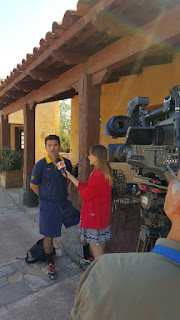While visiting our Chilean family we have been listening to and
sharing the stories of our kids’ cousins and friends. The ones in college have
had tough years with classes and projects taking all of their time. A couple of
years ago some of these kids had practiced sports and extra curricular
activities, but not anymore.
In Chile, while in college, everything else is on hold until
after graduation, something very foreign to the US college system that allows
student athletes to have a hybrid experience. We tell these friends that the
Cal tennis team is coming to Chile to train and bond as they do every other
year on a trip abroad. We explain to them that these students get preferential
treatment when choosing classes and also when taking tests and turning in
homework. Their professors respect their effort to represent their school in
different competitions while trying to excel at their academic work.
When thinking of how special the US system is, I wonder what
has happened to the US youth players who are only using tennis to get into their
school of preference without possessing a love for the game and what is
happening that makes our youth athletes think that home schooling followed by a
professional career is the path to follow.
Fingers are being pointed towards the USTA and its
philosophy of pressing youth talents to the pro circuit rather than the college
path. I don’t want to judge without much research, but if there is any truth to
these claims I would implore the USTA to look at other successful sports and
the path they follow. Let’s look at the way they draft players out of college
to fill their rosters in pro football, baseball and basketball and how they try
to encourage these scholar-athletes to have balanced lives. Let’s try to
protect the local coaches by providing them with resources instead of taking
their players to national training centers in other states. Let’s respect the
way those coaches have achieved trust and engendered a work ethic from their
players instead of pretending that the national training centers have the
miracle recipe for success.
If we can achieve these couple of simple steps the result will
be better local tournaments where the talented players stay and make everyone
around them better. Local players will also make their high school teams better
and eventually have the right mindset to join a college team where they will be
able to experience the thrill of being an NCAA scholar-athlete and possible pro.
 |
| L- Horacio Matta interviewed; R- CAL Men's Tennis winning ways in Chile! |
